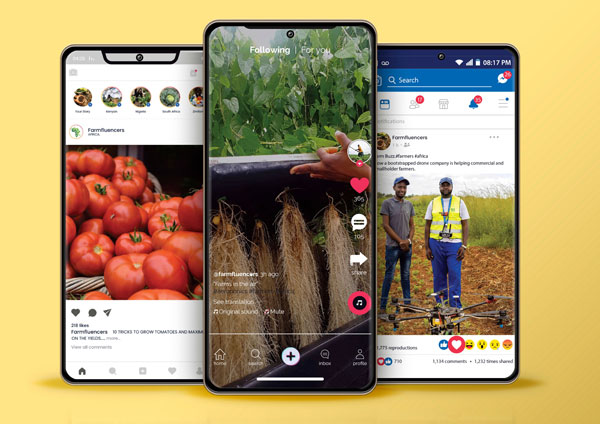
From Tik Tok to Facebook, Instagram to YouTube, tech-savvy farmers are harnessing the power of the internet to network, share knowledge, and sell products and services.
Nairobi, Kenya | BIRD AGENCY | Francis Muiruri, a 31-year-old Kenyan farmer, has found a new income stream on social media; selling information. As a digital consultant, he advises other farmers on successful service delivery on the farm.
“I have been practising pig farming for 10 years and poultry farming for close to three years. I engage with current and potential farmers on Facebook and YouTube, and about three months ago, I joined Tik Tok. I have got a lot of exposure there,” he explained.
Despite living with a disability, the Thika-based, mixed-crop farmer appreciates the platform’s role in commercializing his farming business.
For him, social media is a platform where he gives but also takes.
“I research information on social media and integrate it with my farming experience. I also use the site to sell chicken cages, egg laying birds, quality feeds, help other farmers in warehouse development and search for markets for some of my clients,” he added.
According to the World Bank, farming employs more than 60% of Africa’s total population. It is one of the greatest beneficiaries of the thriving digital space in the continent.
Social media in Africa is quickly becoming young farmers’ favourite networking space. A quick search on various social media reveals farmers’ heavy reliance on the platforms.
In Ghana, farming groups such as the Ghana Farmers Association has almost 70,000 followers on Facebook. Pages on catfish, rabbit, and pig farming also have an immense following on this platform.
Besides Facebook, Tik Tok has also attracted significant numbers of farmers from across the continent interested in farming content.
Mpumezo Ndima of South Africa describes himself on the platform as a wholesome farmer, agriculturalist and consultant.
With over 7,000 followers on the platform, he discusses ideal farming practices, including community-based agriculture and mechanized farming.
Besides using diverse platforms to deliver fresh products straight to consumers’ doorsteps, farmers across Africa use social media to share information, improve techniques, and stay up-to-date on market prices.
‘Poultry Farming in Nigeria’ (@rostalresourcesltd) uses Instagram to showcase chicks of different ages and their respective prices to clients and potential markets.
Besides the standard interactive capabilities offered by social media platforms, an assessment of YouTube reveals an even more robust industry.
Harmony Mazai, a Zimbabwe-based YouTuber, alias “Mr Zim”, showcases how he converted his ancestral village land into a multi-million farming business in one of the videos.
The thriving farmer takes his more than 16,000 subscribers on a step-by-step daily experience at the farm, highlighting the importance of each activity he partakes in.
As Muiruri reveals, “the greatest benefit with using social media in farming is that people experience the journey to success with you.”
“When they trust you are telling the truth and they can confirm your success story, they become inspired to try out the same approach,” he added.
Experts admit social media is a disruptive technology that has positively advanced farming practices in the continent.
According to Enoch Warinda, Executive Director at the Association for Strengthening Agricultural Research in Eastern and Central Africa, the use of social media in farming “needs to be embraced.”
And while Anold Derembwe, Project Manager at Land and Agricultural Bank of South Africa, acknowledges that social media has a critical impact on farming practices, he warns that some information offered could be misleading.
“Some of these farmers do not have the requisite experience and post material that is either half-baked or totally wrong,” he explained.
Derembwe believes social media consumers, especially those seeking information from the space for farming, should validate information shared through social media.
“Consumers must verify authenticity prior to copying or employing it,” he said.
****
SOURCE: bird story agency
 The Independent Uganda: You get the Truth we Pay the Price
The Independent Uganda: You get the Truth we Pay the Price



